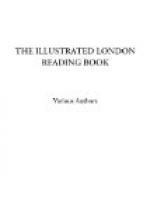Uplifted, calmly sat, and heard the waves
Of stormy Folly breaking at his feet,
Nor shrill with praise, nor hoarse with foal reproach,
And both despised sincerely; seeking this
Alone, the approbation of his God,
Which still with conscience witness’d to his peace.
This, this is freedom, such as Angels use,
And kindred to the liberty of God!
POLLOCK.
* * * * *
THE POLAR REGIONS.
The adventurous spirit of Englishmen has caused them to fit out no less than sixty expeditions within the last three centuries and a half, with the sole object of discovering a north-west passage to India. Without attempting even to enumerate these baffled essays, we will at once carry our young readers to these dreary regions—dreary, merely because their capabilities are unsuited to the necessities which are obvious to all, yet performing their allotted office in the economy of the world, and manifesting the majesty and the glory of our great Creator.
[Illustration: SIR JAMES ROSS’S SHIPS BESET IN A PACK OF ICE.]
Winter in the Arctic Circle is winter indeed: there is no sun to gladden with his beams the hearts of the voyagers; but all is wrapt in darkness, day and night, save when the moon chances to obtrude her faint rays, only to make visible the desolation of the scene. The approach of winter is strongly marked. Snow begins to fall in August, and the ground is covered to the depth of two or three feet before October. As the cold augments, the air bears its moisture in the form of a frozen fog, the icicles of which are so sharp as to be painful to the skin. The surface of the sea steams like a lime-kiln, caused by the water being still warmer than the superincumbent atmosphere. The mist at last clears, the water having become frozen, and darkness settles on the land. All is silence, broken only by the bark of the Arctic fox, or by the loud explosion of bursting rocks, as the frost penetrates their bosoms.
The crews of exploring vessels, which are frozen firmly in the ice in winter, spend almost the whole of their time in their ships, which in Sir James Ross’s expedition (in 1848-49) were well warmed and ventilated. Where there has not been sufficient warmth, their provisions—even brandy—became so frozen as to require to be cut by a hatchet. The mercury in a barometer has frozen so that it might be beaten on an anvil.
As Sir James Ross went in search of Sir John Franklin, he adopted various methods of letting him know (if alive) of assistance being at hand. Provisions were deposited in several marked places; and on the excursions to make these deposits, they underwent terrible fatigue, as well as suffered severely from what is termed “snow blindness.” But the greatest display of ingenuity was in capturing a number of white foxes, and fastening copper collars round




